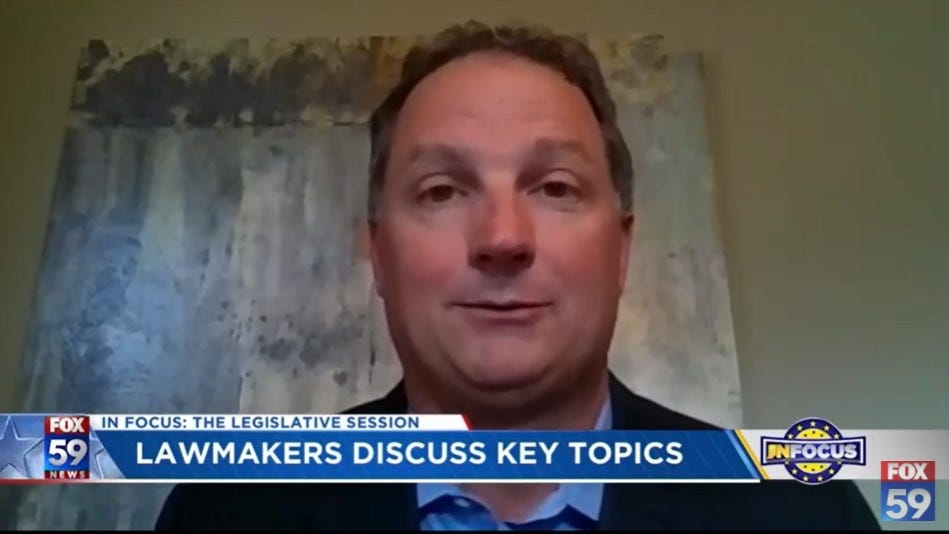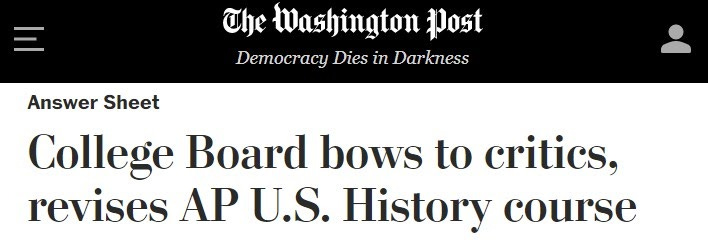A top executive for the College Board is playing a central role in advancing legislation to "limit what teachers can say regarding race, history, and politics in Indiana classrooms."
The executive, Todd Huston, is paid $460,738 to serve as the College Board's Senior Vice President for State and District Partnerships, according to the organization's latest tax filing. The College Board, which designs the SAT and Advanced Placement courses, has an enormous influence on what is taught in high schools across the country.
Huston also has a side hustle: Speaker of the Indiana House of Representatives.
In his role as Speaker, Huston has prioritized controversial legislation to restrict instruction in Indiana classrooms. The bill, HB 1134, would prohibit any classroom materials or instruction that support a list of poorly-defined "divisive topics." Among other things, the bill would prohibit any content that suggests "any individual should feel discomfort, guilt, anguish, responsibility, or any other form of psychological distress on account of the individual's sex, race, ethnicity, religion, color, national origin, or political affiliation."
A companion bill to HB 1134 was pulled from consideration in the Indiana Senate when its author, State Senator Scott Baldwin (R) said it would require high school history teachers to be "impartial" when discussing Nazism. Identical language remains in the House legislation. The legislation allows parents to sue schools that violate its provisions; a teacher that runs afoul of the new constraints could lose their license.
After the Senate pulled its version, Huston pushed forward and held a vote on the legislation on January 26. HB 1134 passed 60-37 on a largely party-line vote. (Nine Republicans opposed the legislation.) Huston voted in favor, over the opposition of Indiana teachers and civil rights groups.
"This bill seeks to pretend that the atrocities of the past have not taken place," Ivan Hicks, Vice President of the Indianapolis NAACP, said. "We need to ensure that our children are in an environment where they have an opportunity to understand the atrocities of the past and the horrors of slavery — not simply the greatness of America."
The Indiana bill, and similar legislation in other states, would also significantly impact what could be covered in high school Advanced Placement (AP) courses, which are shaped by the College Board. If Indiana's bill became law, how could an AP Literature course include works by James Baldwin, which include candid discussions of race and societal responsibility? How could an AP U.S. History course include "The Case for Reparations," which argues that Black people should be compensated for historical discrimination by whites?
"Indiana's HB 1134 includes provisions that would restrict what AP teachers and other high school teachers can teach in the classroom," Jonathan Friedman, Director of Free Expression and Education at PEN America, told Popular Information. "It has vague language that has become a hallmark of educational gag orders around the country, broad prohibitions on how teachers can teach a range of subjects or include certain concepts related to racism or bias in even supplemental materials. It seems pretty clear that the bill directly implicates the work of the College Board; the fundamental work of teaching, especially topics like history and literature."
Hundreds of thousands of students take AP courses each year that culminate in tests administered by the College Board. Does the College Board support Huston's efforts to limit the nature of the topics that can be discussed in these classes? Does the College Board support the broader efforts to limit curriculum about race and history across the nation? What does employing Huston as its top liaison to schools say about the College Board's mission and values?
The College Board did not respond to Popular Information's request for comment.
The College Board's history of catering to the right-wing on race
In 2014, The College Board announced a revised framework for its AP U.S. History course. The purpose of the revision was to encourage students to "think more critically about America’s past." Rather than simply "quizzing students on presidential trivia and the heroic exploits of our founding fathers," students would learn, for example, "how racism was a foundational ideology of the early colonists and that immigrants have long been exploited for their labor."
The right-wing freaked out. The Republican National Committee (RNC) introduced a resolution condemning the new framework, stating that it "reflects a radically revisionist view of American history that emphasizes negative aspects of our nation’s history while omitting or minimizing positive aspects." The RNC also called on Congress to "withhold any federal funding to the College Board…until the [AP U.S. History] course and examination have been rewritten in a transparent manner to accurately reflect U. S. history without a political bias."
Glenn Beck sounded the alarm. Ben Carson, the former Trump administration cabinet member who was running for President at the time, warned that students who complete the revised AP U.S. History course would be "ready to go sign up for Isis.”
These heavy-handed tactics worked. Despite working on the revised framework for 8 years, the College Board capitulated to critics and rewrote the framework:
The College Board said it rewrote the framework in response to "principled feedback" and the new version was "clearer and more balanced." It includes "a section on 'American exceptionalism' after significant backlash from culture conservatives who said the exam wasn’t patriotic enough."
Today, history is repeating itself. Right-wing politicians are once again objecting to candid discussions of race in classrooms. But this time, those objections are not just being accepted and accommodated by the College Board. A top College Board executive is leading the charge.
The College Board's diversity problem
The College Board recognizes it has a problem with diversity. Specifically "African American, Latino, and Native American students" are underrepresented in AP courses. Since AP courses are a key factor in admission to selective colleges, the failure to enroll more of these students perpetuates inequality in higher education.
Critically, the College Board recognizes that this is not a matter of Black or Latino students being unprepared for AP coursework. And it is not only an issue of these students attending a high school where AP courses are not offered. Rather, thousands of these students are prepared but are not enrolling:
For example, in the 2018 cohort, while more than 55,500 African American students were identified as having AP potential in one or more AP subjects, over 26,400 students in that group (48%) did not take an AP Exam in any of those subjects. What’s more, 78% of those 26,400 students went to schools where the AP subjects in which they had AP potential were offered.
The College Board says "we can—and must—do something to move the needle now and eliminate barriers for students with potential."
One way to make these classes more appealing to qualified students of color is to include more diverse content. But the bill championed by Huston will only make it more difficult to candidly discuss racial history or assign acclaimed novels from diverse writers.
The College Board's silence about these bills, and Huston's role, raises questions about whether it is truly committed to making AP courses more representative of the nation as a whole.





Neo Nazis, religious bigots and a motley array of hysterical parents wound up by Fox News pundits are standing for election to local school boards. And the gerrymandered GOP Missouri legislature also has various school censorship bills in progress. Unless we resist by putting up rational candidates in municipal elections this is only going to get worse and teachers are going to leave the profession in droves. Our school superintendent - a highly qualified woman, just prematurely ”retired”. I have published our city school board meeting schedule and website. As soon as elections to school boards and other influential local municipal positions come up, we should put up candidates. Resistance has to be local.
Somewhere, George Orwell is smiling right now (or he's cringing at the accuracy of his dystopian prediction)............